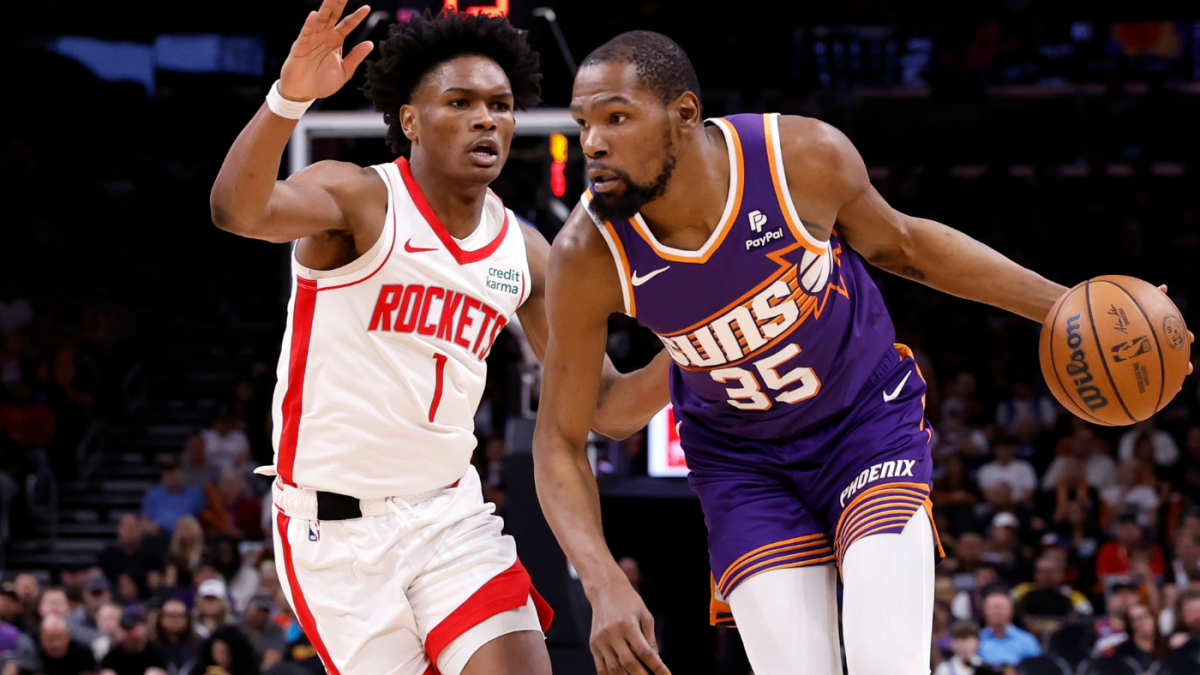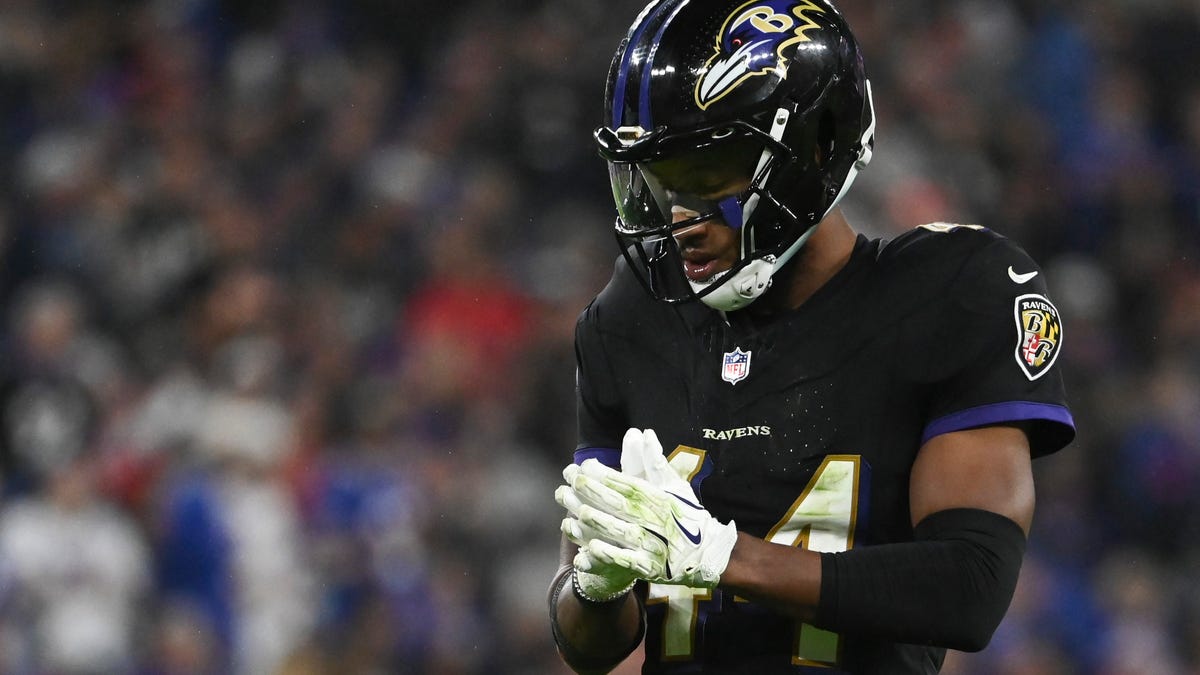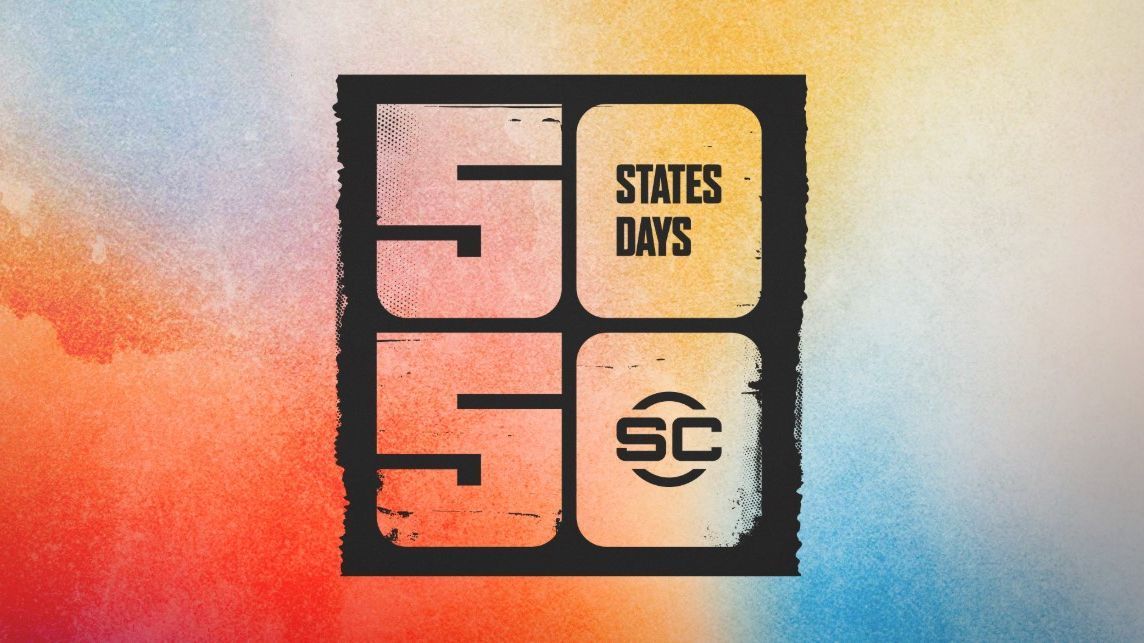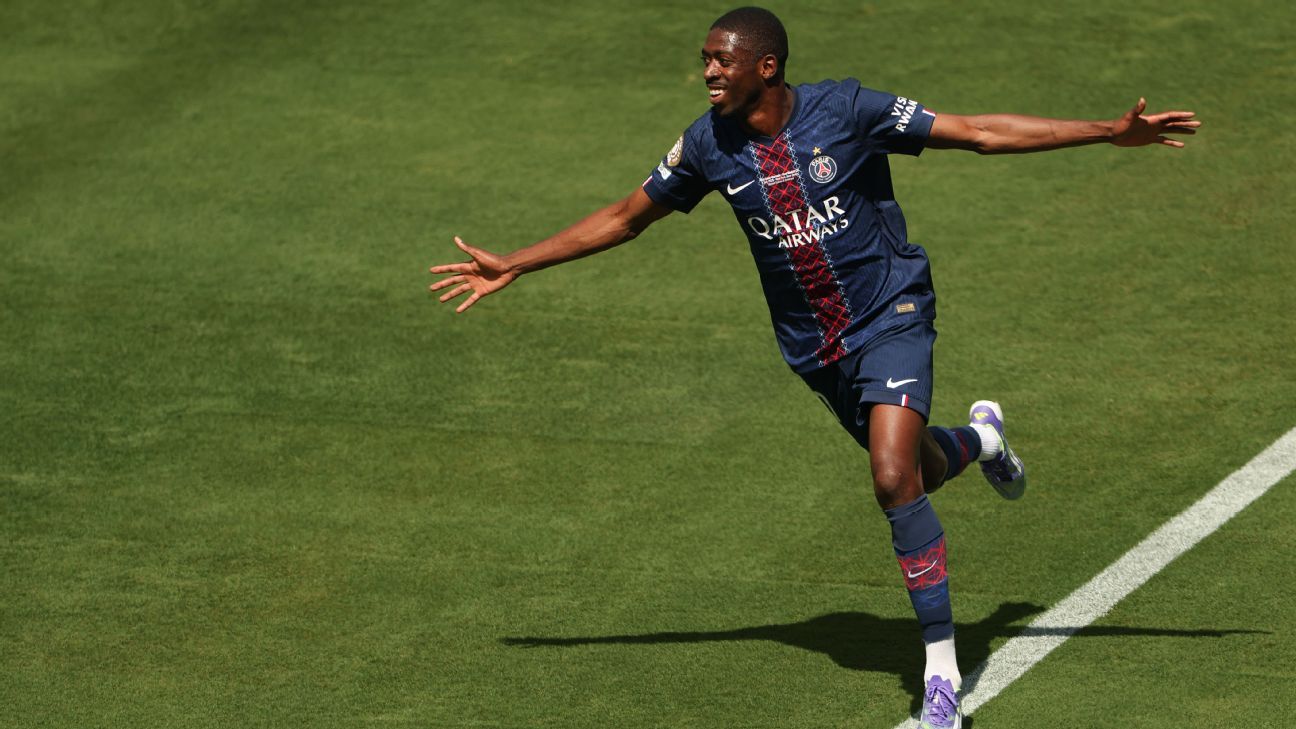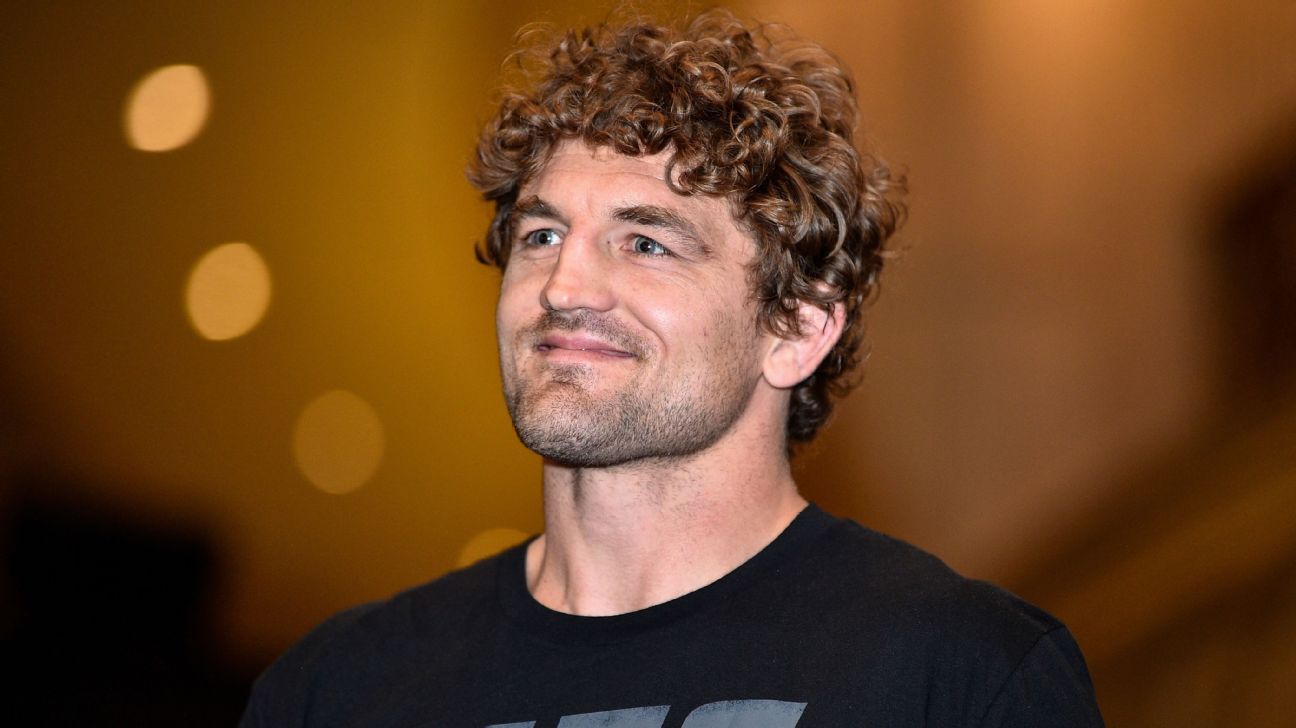Kevin Durant was traded Sunday for… Jalen Green, Dillon Brooks and the No. 10 pick? That’s it? That’s all the Suns got from the Rockets? Surely we’re forgetting something, right? They must be getting back some more future picks? No? They didn’t loop in a third team to get a starting-caliber center back? Did they even get a copy machine like the Nets got for Kyle Korver? As far as we can tell, the Rockets aren’t even getting any office equipment back.
On paper, it’s one of the more underwhelming recent returns on a star of Durant’s caliber in recent memory. Sure, he’s 37, and yes, he did try to control the proceedings through his expiring contract, but Houston, a No. 2 seed, ultimately got a player that just averaged 26.6 points per game on 53-43-84 shooting without giving up a single premium asset.
This is a deal that impacts not only the teams involved, but practically the entire league. So let’s sort through the implications of this mega trade and figure out who won it and who lost it.
Kevin Durant trade grades: Rockets launch into contention, Suns eat crow as Jalen Green becomes swing player
Brad Botkin
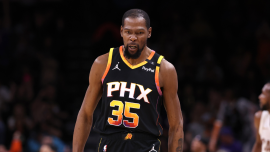
Winner: Houston Rockets
There was a strong argument to be made against the Rockets making any sort of star trade this offseason. They’re so early into this contention window. They don’t even really know what they have yet. Would it really be worthwhile to reshape their team so quickly? Well, it turns out they didn’t have to. Everything they traded was redundant. Amen Thompson crowded Jalen Green out of his role as Houston’s high-upside athletic guard of the future. Dillon Brooks was a stellar defender on a defense that already ranked in the top five. Sure, they gave up a top-10 pick, but last year they used the No. 3 overall selection on Reed Sheppard and couldn’t find minutes for him. They were probably always moving No. 10. The priority for them were their future picks, which are all intact.
What they gave up still had value, but it was ultimately inconsequential in the grander scheme of their rebuild. If that’s all it takes to get Kevin Durant, you do it every time. The fit here is obvious. Houston was good at almost everything last season. The Rockets ranked No. 1 in rebounding, No. 5 in defense and No. 7 in fast-break points… but 21st in 3-point percentage and 22nd in half-court points per play. This team’s glaring flaw was its in ability to score when the game slowed down.
Now they can just dump the ball into Durant and let him cook. He’ll be a year older than he was in Phoenix, but he’s on a roster that suits him much better. The Suns had no athleticism and couldn’t get to the basket. That isn’t a problem for Houston. He’s going for a roster that over-indexed on players with inferior versions of his skill set to a team that had everything except what he does, and it didn’t cost that team anything especially notable.
Are they getting the MVP version of Durant? No. He doesn’t really get to the basket anymore, his free-throw rate has declined and most of the all-in-one metrics suggest he’s starting to decline. But they didn’t pay for that version of Durant. They’re paying for the one that is still an elite tough shotmaker. Anything more is a bonus. At this price, that is still a no-brainer victory.
The one strength the Suns seemingly have is shooting guard. Devin Booker and Bradley Beal will make almost $107 million next season. So, naturally, the bulk of Phoenix’s return is coming in the form of a $33 million shooting guard. Jalen Green at least injects a bit of athleticism onto this team, but that’s never manifested into the sort of consistent, rim-pressuring driving that Houston hoped for when it picked him No. 2 overall. Last year, a career-low 19.1% of his shots came within three feet of the rim. He ranked 90th in the NBA in paint points behind players like Keldon Johnson and Malik Monk, and he’s never been able to average even four assists per game, so any notion that he could slide down to point guard is probably farfetched. He’s a lottery ticket at this point. The talent is there. The fit is not.
Now think about what the Suns didn’t get. While they landed the No. 10 pick, they failed to secure any of the six future first-round picks they’ve traded since 2023, so they can’t tank in the near future. They probably can’t win either, as center was their biggest hole all season and they didn’t get one back in the trade. They didn’t even save money. While they’ll be able to duck the second apron through non-guaranteed salaries, they actually added money when you factor in salary they will have to pay the No. 10 overall pick.
When the Suns traded for Durant, they gave up four of their own first-round picks and one of their own unprotected swaps. They also traded Mikal Bridges, who went on to net five first-round picks and another swap in a deal with the New York Knicks, and Cam Johnson, who is probably worth somewhere between one first-round pick and two. Let’s call that at least 10 first-round picks worth of value to win one playoff series and get, say, a 20% return on investment in the follow-up trade. This is a disaster for a team that’s gotten quite used to those recently.
Winner: The Eastern Conference
This had been an uncharacteristically unkind offseason thus far for the Eastern Conference. The Orlando Magic got significantly better with their acquisition of Desmond Bane. The Milwaukee Bucks, at least for now, seem content to keep Giannis Antetokounmpo. The West is still the significantly better conference, of course, but frankly, the last few transaction cycles had taught us to assume that when elite talent moves, it tends to move West. That hadn’t been the case thus far this summer.
But fortunately for teams competing for the Leastern Conference crown, Durant won’t be opposing them. Despite rumored interest from the Heat and Raptors as well as some potential darkhorse suitors, he is remaining in the West as a Rocket. That’s going to cause problems for an already loaded conference, but hey, that’s just life in the West.
San Antonio can live with missing on Durant. With Victor Wembanyama and a mountain of draft picks in tow, the Spurs’ timeline is so long that it probably made more sense for them to hold their assets for someone younger anyway. The real losers here are the teams that couldn’t do that.
Minnesota got waxed by Oklahoma City in the Western Conference finals. Without their own draft capital, the Wolves were relying on a team like Phoenix to trade them a star for win-now talent. So far as we can tell, no other such team exists at the moment. That means they’re probably trying to run it back, which is going to be difficult if they want to avoid the second apron. Julius Randle, Naz Reid and Nickeil Alexander-Walker are all possible free agents. One of them is probably leaving if Minnesota needs to duck the second apron, and despite back-to-back conference finals trips, the Timberwolves have less room to decline than you’d think. They were two losses away from the No. 8 seed last season.
Miami’s finances aren’t as dire as Minnesota’s, but the Heat aren’t nearly as good as the Timberwolves. They were a 37-win team last season, but with minimal young talent outside of the reportedly untouchable Kel’El Ware and a first-round pick still owed to Charlotte for Terry Rozier, they lacked the assets to get a star at a fair price. Their only real hope was snagging Durant for a discount, which Houston ultimately did. Now the Timberwolves and the Heat are probably stuck. There’s no similar move seemingly on the table.
Among Rockets players, there is no greater winner than Thompson. Green is out of his way, giving him far more of an opportunity to handle the ball. There’s a pretty strong historical template for a nuclear athlete playing next to Durant, and his name is Russell Westbrook. If Thompson can avoid the dumb shots and bad turnovers that doomed the Westbrook-Durant partnership, he’s going to thrive next season. Now, finally, he’ll have some space to work with as an attacker.
But Thompson was already playing quite a bit. Sheppard and Whitmore weren’t. Now, with Green and Brooks gone and no lottery rookie incoming, there are perimeter minutes available for Sheppard and Whitmore. That should bode well for them, and for the Houston offense as well. Sheppard is the second-best shooter on the team behind Durant now, and Whitmore has a lot of upside as an individual scorer. Houston’s defense might dip without Brooks, but the offense now figures to improve meaningfully so long as one of those youngsters hits.
If there are losers in Houston here, it’s the remaining forwards. Houston’s cap sheet is suddenly pretty crowded. Durant is eligible for a two-year, roughly $120 million extension with the Rockets. Alperen Sengun’s not-quite-max-but-still-expensive extension kicks in this season. Fred VanVleet has a team option, but the Rockets will likely decline it to re-sign him to a longer-term deal that starts at a much lower cap figure to potentially duck the tax or at least the aprons. Things are starting to get tight here, especially at forward.
That’s a problem for Smith and Eason, who both not only play forward, but are entering contract years and are eligible for extensions. The Rockets can probably only afford to keep one of them at the prices they’ll likely command. Eason was probably the more valuable player last season. Smith, a former No. 3 overall pick, has more long-term upside. They’ll surely get trade offers for both, but for now, the Rockets are probably going to hold off on trading either. They can both help the immediate championship push. They’re both good players. But they’re both entering very uncertain seasons, and likely would have had an easier time getting paid had they been included in the deal.
As we’ve covered, the Suns don’t control their own first-round picks for the foreseeable future. Ideally, in a star trade in which that is the case, that team would prefer to get back some of its own picks to unlock the ability to tank. Well, the Suns didn’t do that. While control of their picks is somewhat fluid do to the nature of some of the secondary and tertiary swaps they’ve moved, these are the teams that are likeliest to wind up with their first-round picks for the next six years.
- 2026: Memphis Grizzlies
- 2027: Houston Rockets
- 2028: Brooklyn Nets
- 2029: Houston Rockets
- 2030: Washington Wizards
- 2031: Utah Jazz
We’ve already covered the Rockets as a winner, and they’re an even bigger one with these picks factored in. The Suns are a mess. They’re a capped out 36-win team in a loaded conference that just turned its best player from a year ago a decent supporting wing, a redundant scorer and a late lottery pick. In the short term, they’re probably a mildly competitive team that tops out in the Play-In Tournament. In the longer term, what happens if Devin Booker realizes how poorly managed his team is and decides he’d like to play a for an organization that knows what it’s doing? Without their picks, they have no way of rebuilding, and with Durant now in Houston, the Rockets now have less of a reason to ever trade the Suns their own picks back in a Booker deal.
Somebody is getting a high lottery pick from the Suns in the near future. Maybe multiple teams will. These are, for the time being, the most valuable outstanding picks in the NBA save perhaps Milwaukee’s.
The Spurs aren’t a loser because they missed out on Durant. They’re going to be fine. They can trade for practically anyone on the market if they want to, and they appear to be leaning toward younger players with an eye on a star more compatible with Wembanyama’s timeline.
Of course, one of the teams they’re going to be competing with for those players is Houston, and part of the reason the Spurs seemingly kept their best stuff off of the table for Durant was because they needed to make sure they had everything in reserve should they eventually need to compete in a bidding war for, say, Giannis Antetokounmpo. They can still do that… but so can the Rockets.
That’s where San Antonio loses here. The Rockets still have all of their best assets, but they’ve gotten substantially better in the short term. They are more attractive to stars without becoming less capable of actually acquiring them. The Rockets and Spurs are going to be competing with one another for quite some time, and as in-state rivals, there’s a natural competitiveness between them. Houston just got a massive head start on San Antonio in their mutual championship pursuits.
Winner: Teams with a center to trade
As we’ve covered, the Suns still have a gaping hole at center. Sure, they could just draft a center, but the best big man available, Khaman Maluach, is probably going to be gone by No. 10. The Suns have been somewhat averse to drafting anyway in the recent past. Mat Ishbia is all about winning right now. Rookies take years to develop.
In other words, that No. 10 pick is theoretically in play now for any team with a center to trade. The Utah Jazz with Walker Kessler, the Brooklyn Nets with Nic Claxton, the Dallas Mavericks with Daniel Gafford, these teams should all be huddling up right now and trying to figure out how to relieve Phoenix of the lottery pick that doesn’t fit its (delusional) win-now ambitions.
All of those teams with centers to trade had likely spent the past few weeks negotiating with the Los Angeles Lakers. Rob Pelinka is desperate for a big man, and we know how much he’s willing to pay for one because we saw him give up a pile of assets for Mark Williams at the deadline before a physical killed the deal. The advantage he’s largely had in these negotiations has been how few teams are ever all that eager to trade for a non-shooting center. Most teams either already have one or want to pursue one on the cheap. In other words, it was a buyer’s market for bigs.
But now, another high-end bidder has entered the marketplace. That means the Lakers are not only directly competing with the Suns for size, but that Phoenix now exists as a source of leverage. “You want our center, Rob? Well, Brooklyn offered us X, so you need to give us Y.” With the draft mere days away, this is a significant curveball for the Lakers that probably made getting their big man a bit harder.



